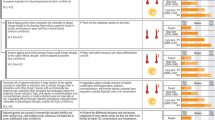Abstract
This paper breaks with the sociological notion of ‘risk society’ and argues in favour of a philosophical view that sees the two planetary threats of late modernity, nuclear weapons and global warming, as ultimate challenges to morality and politics rather than risks that we can take and manage. The paper also raises the question of why we should feel responsible for the effects of these two global challenges on future generations and in this sense elaborates on the transgenerational chain of parenthood rather than on considerations of justice.
Similar content being viewed by others
Notes
Monthly Notices of the Royal Astronomical Society, as summarized in the New York Times of 11 March 2008.
This notion is rather analytical and neutral and does not coincide with Giddens’ “manufactured risk” (Giddens 1999, p. 4), an idea that contains a whole philosophy of history as it is based upon the assumption of an “end of nature” and an “end of tradition”.
It seems to me that only responsibility for others, including future generations, and therefore for the environment, justifies not doing something that could cause harm, even if full scientific evidence of that harm is not yet provided; cf. Whiteside (2006). In this sense the precautionary principle is based on the principle of responsibility.
The nature of the human animal requires civilization (work, communication and trade) as the main tool of survival and well-being.
In the sense of my theory of global challenges the ultimate problems are up to now global warming and ozone layer depletion, but other issues—think of human biotechnology—may in the future be added as soon as enough scientific evidence of their global and lethal character comes up.
To be clear, the primary problem is if we want to take on responsibility for humankind’s survival, while the second is a problem of fairness, that is, if we want to extend it impartially to future generations, far beyond those with whom we have emotional ties.
The complete argument regarding normative doctrines, particularly Rawls’s, is developed in chapter five of Cerutti (2007); there is no room here for a discussion of the two formulations of §44 in the 1971 and 1999 editions of A Theory of Justice. Nor can I enter a broader discussion of normative approaches to climate change, cf. Gardiner (2004), and, for an attitude closer to Dworkin than Rawls, Gosseries (2007).
The mental experiment (in moral philosophy) of imagining a generation ceasing to generate children altogether is of little interest to political philosophy, which is used to reflect on actual or likely, rather than fictitious, states of the world.
This view is not uncontested, cf. Gosseries (2004, pp. 20–21).
As the previous discussion of moral arguments, the idea of redefining ‘humankind’ in the face of global challenges and the discussion of its not-so-linear political consequences are developed in the second part of Cerutti (2007).
References
Cerutti, F. (2007). Global challenges for Leviathan: A political philosophy of nuclear weapons and global warming. Lanham, MD: Rowman and Littlefield.
Gardiner, S. (2004). Ethics and global climate change. Ethics, 114(Apr), 555–600.
Giddens, A. (1999). Risk and responsibility. Modern Law Review, 62(1, Jan), 1–10.
Gosseries, A. (2004). Penser la justice entre les générations, De l’affaire Perruche à la réforme des retraites. Paris: Aubier (Flammarion).
Gosseries, A. (2007). Cosmopolitan luck Egalitarianism and the greenhouse effect. Canadian Journal of Philosophy, suppl. vol. 31 (D. Weinstock (Ed.), Global Justice, Global Institutions), 279–309.
Klinke, A., & Renn, O. (2006). Systemic risks as challenge for policy making in risk governance. Forum Qualitative Sozialforschung/Forum: Qualitative Social Research, 7(1), Art. 33. http://nbn-resolving.de/urn:nbn:de:0114-fqs0601330.
Pidgeon, N., Kasperson, R., & Slovic, P. (Eds.). (2003). The social amplification of risk. Cambridge: Cambridge University Press.
Rawls, J. (1971). A theory of justice. Cambridge, MA: Harvard University Press.
Whiteside, K. (2006). Precautionary politics. Cambridge, MA: The MIT Press.
Author information
Authors and Affiliations
Corresponding author
Rights and permissions
About this article
Cite this article
Cerutti, F. Defining Risk, Motivating Responsibility and Rethinking Global Warming. Sci Eng Ethics 16, 489–499 (2010). https://doi.org/10.1007/s11948-009-9176-8
Published:
Issue Date:
DOI: https://doi.org/10.1007/s11948-009-9176-8




